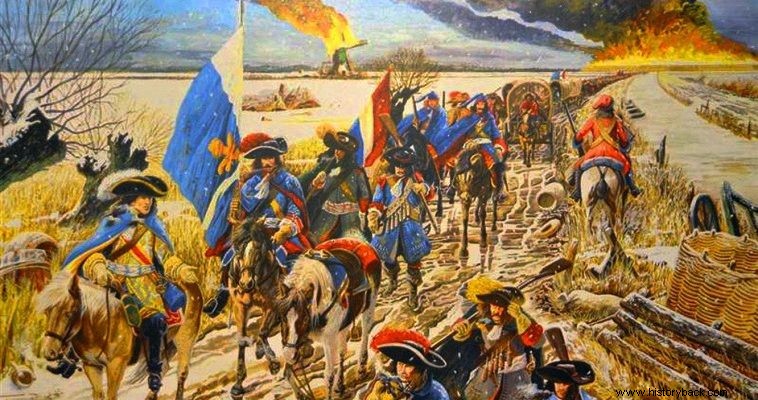
France in the 1680s was the largest and most powerful European country. He had the largest army. Under the "Sun" King Louis XIV France gained territory and twice defeated the Dutch. Louis' expansionist policy had frightened Europe. Especially after the restoration of the Dutch William of Orange to the English throne, the rest of Europe was ready to unite against the French king.
After Louis renounced the Edict of Nantes, which protected the French Protestants (Huguenots), the Protestant European countries turned against him. In 1686, the Grand Alliance was formed in which Austria (Empire of Habsburg), Spain, Sweden, the Netherlands and several German states initially participated. Later England, Bavaria and Piedmont (northern Italy) also joined.
Louis reacted with arrogance and in 1688 ordered his army to invade the Palatinate and destroy it. French troops burned, leveled houses, villages and entire cities. On December 20, 1688 Versailles informed the generals in the Palatinate to hasten the destruction. That's what happened. The historic city of Heidelberg was set on fire, but fortunately the inhabitants had prepared themselves and as soon as the French left, with a heroic struggle, they contained the fire.
Manheim followed which had been surrendered by treaty to the French troops. Nevertheless, the population was forced to move to Alsace and the city was razed to the ground. "The king wishes the whole population to be transferred to Alsace and all the buildings in the city to be demolished. Let nothing be left standing", said the relevant order.
Any resident who attempted to return or tried to put out the fire was killed without mercy by the French. This was followed by the destruction of the also historic city of Worms, Speyer and Oppenheim. The inhabitants of all these cities were sent to Alsace, Lorraine and Burgundy.
This was followed by the leveling of Bingen. It is worth noting that along with the cities, all the surrounding villages in a radius of approximately 16 km were destroyed. Under these circumstances, it is not paradoxical that the German citizens responded with cruel reprisals against the French, only for them to suffer the same afterwards. Small French groups were being attacked and of course there were no survivors. And the French, however, executed citizens only if they seemed suspicious.
The War of the Grand Alliance, the first world war in history fought on six European fronts, in Spain (Pyrenees), Flanders, the Rhine, Northern Italy, Ireland and Scotland. Conflicts occurred between the French and English in North America and between the English, Dutch and French in Asia and the Caribbean, it was just as cruel and destructive as the previous ones. What if today historians describe it as one of the "Lace" wars?
